#poverty by america
Text
"I sit on a man's back, choking him and making him carry me, and yet assure myself and others that I am very sorry for him and wish to ease his lot by all possible means, except by getting off his back." - Count Leo Tolstoy, rich guy who knew he was the problem, quoted in Poverty by America by Matthew Desmond
34 notes
·
View notes
Text
Book Review 64 – Poverty, by America by Mathew Desmond

I read Desmond’s Evicted a while back and found it a really excellent bit of sociology/journalism about the specifics and mechanisms of housing inequality and how modern slumlords exploit the poor. So this has been vaguely on my list for a decent while. Sadly, I found it a bit of a disappointment – more listing of facts and statistics that I already basically knew to support a manifesto than anything new or enlightening to me. Not that it’s bad, but if it was 20 pages instead of 200 I’m not sure much of value would really have been lost. Many such cases, I suppose.
The book is about exactly what it says is, a polemic decrying and investigation into why the United State’s poverty rates, and why extremes of material want are so much more common there than in comparable (poorer, even) western democracies. Refreshingly, Desmond has a clear thesis he doesn’t beat around the bush before saying – self-interest, essentially. The affluent benefit from having an underclass to extract resources from, and from excluding its members from the amenities they share, so they do. The book spends most of its wordcount enumerating and describing what Desmond considers the main problems: direct exploitation (underpayment, predatory financiers, slums, etc), an underresourced and misdirected wellfare state (compare the cost of middle/upper-class targeted programs like the mortgage interest deduction or tax-exempt savings accounts to the cost of adequately ending hunger or providing healthcare) and segregation (both spatial/residential and in terms of access to public or semi-public services).
It’s pretty traditional for a book like this to spend 90% of its wordcount diagnosing problems and then end with some publisher-mandated optimism and a chapter of solutions with a fraction of the care put into them as in the diagnosis. Desmond, to his credit, avoids this – each chapter includes both the problems and he considers the most feasible solutions to them to be. He actually makes a point of it, arguing that having practical, winnable goals that will actually improve things when achieved (and then celebrating them when they are) is a key part of any political organizing with a chance of actually working. Now, what I think of those solutions varies quite wildly, but they’re there and exactly what you’d expect for his politics – and speaking as someone whose been renting my entire life I wholly endorse fucking all the tax benefits you get essentially for having the cash on hand to make a down payment. (Relatedly, the book has a great deal of scorn for comfortable, affluent people whose progressive politics amount to lots of critiquing and zero actual positive action.)
Desmond is clearly writing this from the point of view of a(n inspirational) public intellectual; that is, by writing this he’s trying to call an audience and movement based around it into being. He likes the label Poverty Abolitionist and the central project of the book is basically trying to make it happen as an umbrella term people identify with – especially the affluent well-heeled people who read books like this, and might be persuaded to start boycotting companies for underpaying their employees or union-busting, or campaigning against government subsidies that benefit them instead of the poor. I did appreciate the relative hopeful tone, given the usual coverage of American politics – or, well, is ‘Washington was at least this fucked when it passed the Civil Rights Act or the New Deal” optimistic? Whatever the right word is.
Now, I’m summarized all this in ~500 words, obviously actually making the argument needs more space than that. But it really did not need to be as long as it was – a huge fraction of the wordcount is spent either restating arguments or just throwing around numbers and statistics without really contextualization (anyone who spends so much time comparing expenses and budgets across the decade should be legally required to adjust for inflation imo). There’s a good, well-cited (excessively cited, if anything. The footnotoes are like a fifth of the book) persuasive essay in here, but there is so much fat to cut around it.
Anyway yes, disappointing reading experience, given I was hoping for more sociology and less polemic. But as far as American political polemic goes, it’s pretty decent.
23 notes
·
View notes
Text
This is who we are: the richest country on earth, with more poverty than any other advanced democracy. If America’s poor founded a country, that country would have a bigger population than Australia or Venezuela. Almost one in nine Americans—including one in eight children—live in poverty. There are more than 38 million people living in the United States who cannot afford basic necessities, and more than 108 million getting by on $55,000 a year or less, many stuck in that space between poverty and security.
Poverty, By America, Matthew Desmond
17 notes
·
View notes
Photo
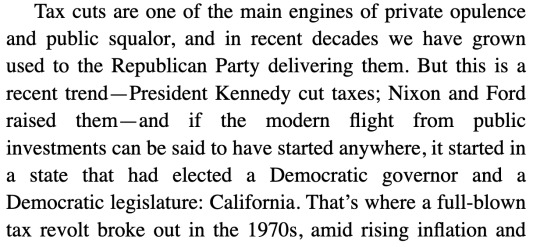

Matthew Desmond, Poverty, by America
20 notes
·
View notes
Text
When my family moved to East Arlington, a suburb of Boston, after taking new jobs, we landed in a neighborhood with far fewer issues and far less joy. When the snow fell there, the neighbors cleared only their own walks, stopping abruptly at the property line.
Poverty by America by Matthew Desmond
6 notes
·
View notes
Text
Evicted, A Book Review
Has a book ever made you so uncomfortable that you wound up reading faster? Because I read this book in about a week (last year I read 14 books. I'm not one of those Booktok people that reads 5 thousand-page novels a month).
Evicted: Poverty and Profit in the American City by Matthew Desmond is a non-fiction book published in 2016 about the affordable housing crisis. More specifically, it examines the lives of several poor families living in Milwaukee, Wisconsin and tells their stories. This book examines how and why people become trapped in cycles of poverty and what constant eviction does to people physically, financially, and psychologically. It also suggests ways our wellfare system could be overhauled to alleviate this.
Time, care, and empathy was put into this research. Desmond made an effort to look at both white and Black families during his project, analyzing the racial discrimination and segregation that is still very much a part of everyday American life. The families in these stories had problems such as drug addictions, criminal records, and a history of poor choices (you know, the kinds of things Fox News likes to rant about), but still portrays them in a sympathetic light. There is one person in this book, Crystal, who was prone to erupting into fits of violence when under exreme stress due to a history of severe childhood trauma. She hurt people, but I still came away from this book firmly believing that she deserved a roof over her head.
One of the chapters that really sticks out in my mind is titled "Lobster on Food Stamps." It tells the story of a poor woman in a trailer park who spent her entire monthly allotment of food stamps on a single, indulgent seafood dinner for one. Stories like this are a very common talking point for political pundits that like to demonize poor people. But Evicted uses this woman's story to explain why this happens: when you are extremely poor, it is next to impossible to dig yourself out no matter how much you save and what choices you make. There is no way out. Genuinely. Indulging will make the pain go away, at least for today. It is, ultimately, a very human choice.
Evicted is a difficult read, emotionally. Every time I sat down to read this thing it was always "Oh, great, Arleen's getting kicked out of another place for some bullshit reason." This isn't a fun book, but it's important. I've also heard good things about Desmond's followup Poverty, by America.
Now, nonfiction can't be spoiled, so let me end this review with the last line of the book:
"No moral code or ethical principal, no piece of scripture or holy teaching, can be summoned to defend what we have allowed our country to become."
#evicted book#book review#read a book#nonfiction#matthew desmond#poverty by america#housing costs#housing is a human right
4 notes
·
View notes
Text
Poverty, By America - Matthew Desmond

Summary: Sociologist Matthew Desmond examines how the poor are kept poor in the United States.
Quote: “Poverty isn’t simply the condition of not having enough money. It’s the condition of not having enough choice and being taken advantage of because of that.”
My rating: 4.5/5.0 Goodreads: 4.32/5.0
Review: A short but targeted attack on policies and social behaviors that keep poverty such an issue in the United States. Desmond makes his points with searing language backed by clear data and personal anecdotes of those affected by poverty. He doesn’t coddle, but nor does he despair. Alongside the clearly identified problems, he offers actionable solutions.
To-read: Desmond’s book Evicted is also excellent.
4 notes
·
View notes
Text
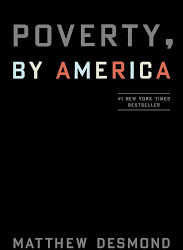
Some of my favourite quotes from Matthew Desmond’s newest book:
“‘It is much easier in the United States to be decently dressed than it is to be decently housed, fed, or doctored.’”
“As the sociologist Gerald Davis has put it: Our grandparents had careers. Our parents had jobs. We complete tasks.”
“Many features of our society are not broken, just bifurcated. For some, a home creates wealth; for others, a home drains it. For some, access to credit extends financial power; for others, it destroys it.”
“The question that should serve as a looping incantation, the one we should ask every time we drive past a tent encampment, those tarped American slums smelling of asphalt and bodies, every time we see someone asleep on the bus, slumped over in work clothes, is simply: Who benefits? Not Why don’t you find a better job? Or Why don’t you move? Or Why don’t you stop taking out such bad loans? But Who is feeding this?”
“Things collectively shared, especially if they are shared across class and racial divides, come to be seen as lesser. In America, a clear marker of poverty is one’s reliance on public services, and a clear marker of affluence is one’s degree of distance from them…There was a time when Americans wished to be free of bosses. Now we wish to be free of bus drivers. We wish for the freedom to withdraw from the wider community and sequester ourselves in a more exclusive one, pulling further and further away from the poor until the world they inhabit becomes utterly unrecognizable to us.”
3 notes
·
View notes
Text

Poverty is pain, physical pain. It is in the backaches of home health aides and certified nursing assistants, who bend their bodies to hoist the old and sick out of beds and off toilets; it is in the feet and knees of cashiers made to stand while taking our orders and ringing up our items; it is in the skin rashes and migraines of maids who clean our office buildings, homes, and hotel rooms with products containing ammonia and triclosan.
--
Many are not officially counted among the “poor,” but what then is the term for trying to raise two kids on $50,000 a year in Miami or Portland? What do you call it when you don’t qualify for a housing voucher but can’t get a mortgage either? When the rent takes half your paycheck, and your student loan debt takes another quarter? When you dip below the poverty line one month then rise a bit above it the next without ever feeling a sense of stability? As a lived reality, there is plenty of poverty above the poverty line.
--
which is more primary, race or class? Which is the root of social inequity and which the branches? Which organ is more important to you, your heart or your brain?)
--
Most social problems are complicated, of course, but a retreat into complexity is more often a reflection of our social standing than evidence of critical intelligence.
--
Hungry people want bread. The rich convene a panel of experts. Complexity is the refuge of the powerful.
--
Median rent rose from $483 in 2000 to $1,216 in 2021.
--
Today, the biggest beneficiaries of federal aid are affluent families. To benefit from employer-sponsored health insurance, you need a good job, usually one that requires a college degree. To benefit from the mortgage interest deduction, you need to be able to afford a home, and those who can afford the biggest mortgages reap the biggest deductions. To benefit from a 529 plan, you need to be able to squirrel away cash for your children’s college costs, and the more you save, the bigger your tax break, which is why this subsidy is almost exclusively used by the well-off.
--
You could fit three newly built English homes into the average new American home.
--
We are much richer than citizens of other countries, including other wealthy ones, and we’re much richer than our forebearers. And yet, the dominant mood among the American middle and upper classes is one of fret and worry. In past eras, the rich used to flaunt their wealth, including by showing their indifference to work. The American aristocracy of today seem to prefer complaining to one another and working nonstop. Has there ever been another time, in the full sweep of human history, when so many people had so much and yet felt so deprived and anxious?
--
These feelings have proven incredibly effective at preventing us from seeing ourselves as authors of inequality. We like healthy returns. We like smart products. We like low prices and raise a fuss when they creep up. Fast and cheap—that’s how we prefer to consume in America. But somebody has to pay for it, and that somebody is the rag-and-bone American worker. Poverty wages allow rock-bottom prices. Relentless supervision and control facilitate fast service. The working class and working poor—and, now, even the working homeless—bear the costs of our appetites and amusements.
--
Follow the money, all of it, and you can see how a trend toward private opulence and public squalor has come to define not simply a handful of communities, but the whole nation.
--
The problem, Tolstoy ultimately decided, was himself and his fellow affluents, who lived idle lives.
“I sit on a man’s back, choking him and making him carry me, and yet assure myself and others that I am very sorry for him and wish to ease his lot by all possible means—except by getting off his back.”
--
Choice is the antidote for exploitation.
--
a crucial step toward ending poverty is giving more Americans the power to decide where to work, live, and bank, and when to start a family.
--
If you have found security and prosperity and wish the same for your neighbors, if you demand a dignified life for all people in America, if you love fairness and justice and want no part in exploitation for personal gain, if all the hardship in your country violates your sense of decency, this is your fight, too.
--
poverty is the dream killer, the capability destroyer, the great waster of human potential. It is a misery and a national disgrace, one that belies any claim to our greatness.
0 notes
Text
“Empowering Lives: A Comprehensive Guide to Launching and Managing Food and Medical Relief Programs in Developing Nations” book is now available on Amazon
by Embassy Row Project
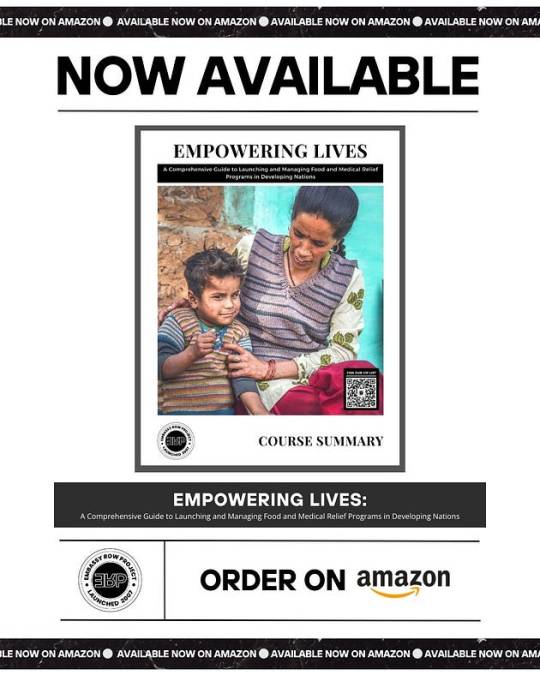
“Empowering Lives: A Comprehensive Guide to Launching and Managing Food and Medical Relief Programs in Developing Nations” serves as an essential resource for humanitarian aid workers, medical professionals, philanthropists, and NGO stakeholders who aim to make a significant difference in the world. The book provides an in-depth exploration of the various aspects involved in initiating and maintaining effective food and medical relief programs in developing nations.
Key Takeaways
· Understanding the Landscape: Familiarize yourself with the realities and nuances of relief programs in developing nations, allowing for context-sensitive approaches.
· Needs Assessment: Learn how to map out food and medical requirements accurately, optimizing the distribution of resources.
· Effective Community Engagement Strategies: Discover how fostering unity within communities can maximize the impact of your relief programs.
· Planning and Executing Efficient Logistics: Master the complex logistics involved in delivering aid, ensuring that assistance reaches those in dire need swiftly and efficiently.
· Creating and Leveraging Strategic Partnerships: Learn how to build strong alliances that enhance your program’s reach, effectiveness, and sustainability.
· Comprehensive Training for Staff and Volunteers: Discover how to equip your team with the necessary skills and knowledge to carry out their roles effectively.
· Enforcing Food and Medical Safety Protocols: Learn about crucial safety standards in food and medical aid, protecting beneficiaries from potential harm.
· Fostering Sustainable Food and Health Solutions: Understand the importance of moving beyond immediate relief to create long-term, sustainable solutions.
· Leveraging Technology in Relief Programs: Discover how to use digital tools to enhance your program’s efficiency, reach, and impact.
· Addressing Mental Health in Relief Programs: Learn to incorporate mental health support into your programs, acknowledging the psychological impact of poverty and crises.
“Empowering Lives: A Comprehensive Guide to Launching and Managing Food and Medical Relief Programs in Developing Nations” provides an in-depth and insightful exploration of the complexities of relief work, arming you with the knowledge and skills to maximize your impact. From practical logistics to cultivating community relationships, this guide serves as an essential companion for anyone committed to improving the lives of those living in developing nations. Step into a journey of empowerment, resilience, and meaningful change, transforming lives one relief program at a time.
— — — — — — — — — — — — — — — — — — — — — — — — — — — — — — — — — — — — — — — — — — — — — — — — — -
Now Available on Amazon!
Kindle: https://www.amazon.com/Empowering-Lives-Comprehensive-Launching-Developing-ebook/dp/B0CDB2LLZ2/ref=sr_1_7?crid=1TTVJUER1EGHZ&keywords=Philanthropy+tops&qid=1693409399&s=digital-text&sprefix=philanthropy+tops%2Cdigital-text%2C681&sr=1-7
— — — — — — — — — — — — — — — — — — — — — — — — — — — — — — — — — — — — — — — — — — — — — — — — — -
For more books, please visit James Scott on Amazon.
You may also visit Embassy Row Project.
#Embassy Row Project#ERP#James Scott#Empowering Lives#Relief Programs#Developing Nations Aid#Global Impact#Philanthropy tops#Understanding philanthropy#Nonprofit for dummies 2020#Poverty by america desmond#Poverty matthew desmond#Poverty in america matthew desmond#Poverty by america#by matthew desmond#Philanthropy for dummies#Philanthropy patch#Humanitarian patch#Start a nonprofit#How to start a nonprofit#Nonprofit for dummies#How to start a nonprofit organization
1 note
·
View note
Text
Watch the P4P Discussion with Pulitzer-prize winning author, Matthew Desmond
On Tuesday, July 25th, 2023, people from across the country joined Politics for the People host Cathy Stewart for a virtual discussion with Matthew Desmond, about his recent book: POVERTY, BY AMERICA.
You can watch the full video below:
Cathy Stewart kicked off our conversation with the following question:
Thank you so much for this book – such a chilling portrait of the inhumane cost of the…
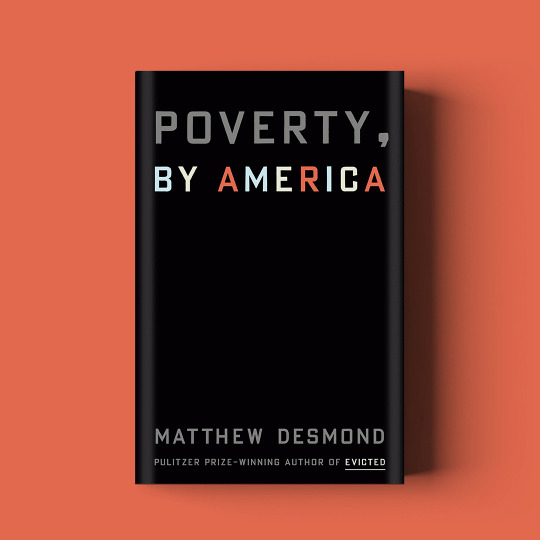
View On WordPress
#Cathy L. Stewart#Conference call tape#Matthew Desmond#Politics for the People#Politics for the People book club#Poverty By America
0 notes
Text
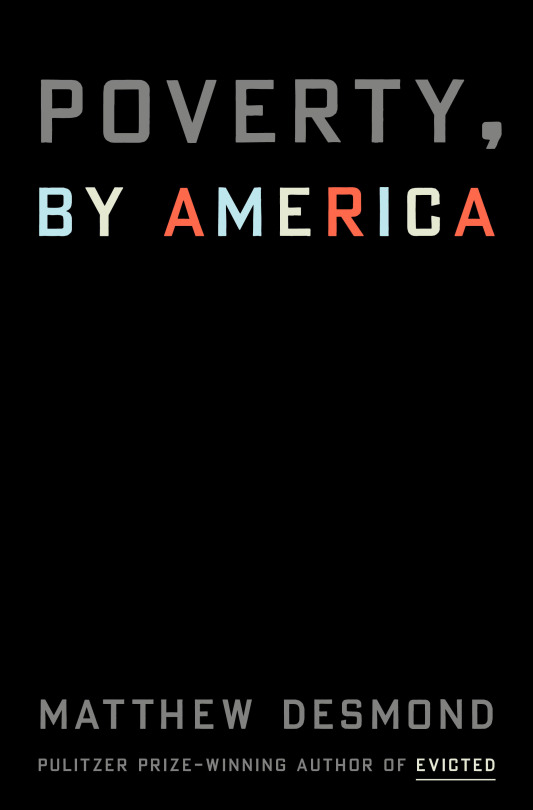
[2023|53] Poverty, By America (2023) written by Matthew Desmond
0 notes
Text
A higher minimum wage is an antidepressant. It is a sleep aid. A stress reliever. Vocal segments of the American public, those with brain space to spare, seem to believe the poor should change their behavior to escape poverty. Get a better job. Stop having children. Make smarter financial decisions. In truth, it’s the other way around: Economic security leads to better choices.
Poverty, By America, Matthew Desmond
15 notes
·
View notes
Photo
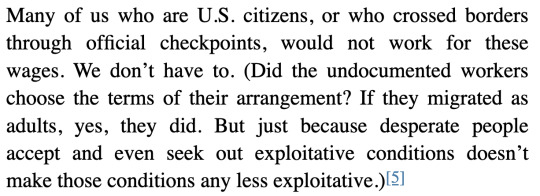
I’m reading Matthew Desmond’s Poverty, By America and this is such succinct point, and one that I wish more people would internalize when it comes to the mistreatment of women.
#the number of people who seem to believe that adult women cannot be exploited by the pornography industry or the sex trade is appalling#poverty by america
13 notes
·
View notes
Text
Had we been able to afford to buy a home in East Arlington, our property's value would have grown exponentially faster than it would have had we stayed on Madison's South Side. But in exchange, we'd have had to give up love for a community and trade a feeling of being known and held for the anomie of wealth. To us, that was a bad bargain.
Poverty by America by Matthew Desmond
2 notes
·
View notes
Text
1 note
·
View note